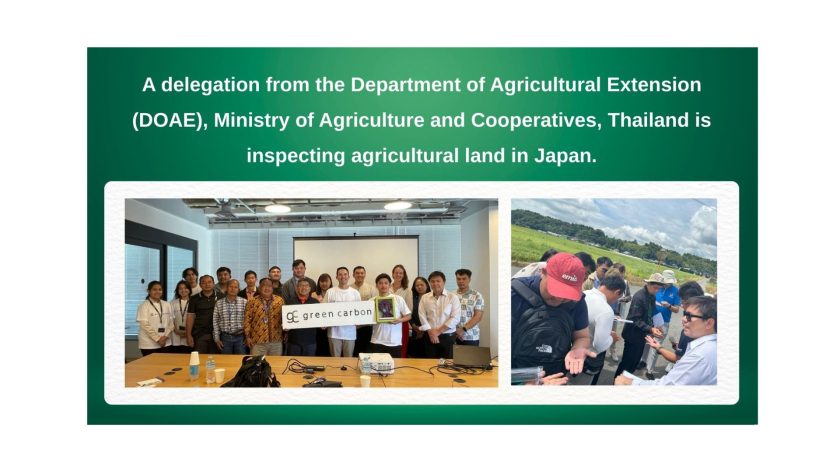Receives High Praise for its Nature-Based Carbon Credit Generation Partnerships and Achievements in Thailand
Green Carbon, Inc. (Representative Director: Jun Okita), a company that develops and sells nature-based carbon credits, is pleased to announce that a 14-member delegation from the Department of Agricultural Extension (DOAE) of the Ministry of Agriculture and Cooperatives, Thailand, led by Deputy Director-General Khongsak Songraksa, visited Green Carbon’s headquarters and inspected a farm in Tokyo on August 13 (Wed) and 14 (Thu). The visit was arranged at the request of the Royal Thai Embassy in Japan. During the visit, Green Carbon introduced its nature-based carbon credit generation projects in Southeast Asia, particularly in Thailand, and discussed possibilities for future collaboration.
https://www.jircas.go.jp/ja/reports/2019/r20190910
〇For inquiries regarding this release and further details, please contact:
〇Click here to download the Green Carbon Inc. company profile:

◆Background of the Headquarters Visit
Green Carbon is focused on generating nature-based carbon credits, primarily in Southeast Asia, with a wide range of projects including forest conservation, rice paddies, mangrove afforestation, livestock methane reduction, and biochar projects. The company develops carbon credit projects that are well-suited to the natural resources of each region and uses satellite data for site selection and monitoring, ensuring efficient and transparent project operations.
The company has a particular focus on carbon credit projects in Thailand that utilize AWD (Alternate Wetting and Drying) and biochar. Agriculture is a major industry in Thailand’s GDP, but it is also a region highly vulnerable to the effects of climate change. By introducing Green Carbon’s technology, it is expected to improve agricultural sustainability and invigorate the carbon credit market, which is why the company is expanding its operations in Thailand.
Furthermore, Green Carbon’s project to reduce methane gas emissions by introducing AWD in rice paddies in Kamphaeng Phet Province, Northern Thailand, has become the first and largest project by a Japanese company to be officially listed in the “Premium T-VER,” a high-quality voluntary credit system promoted by the Thai government. This achievement, among others, has contributed to building a strong track record in Thailand.
Based on these achievements, the Thai Embassy reached out to Green Carbon to arrange this visit by the DOAE delegation, which came to Japan to observe carbon credit and biochar initiatives.
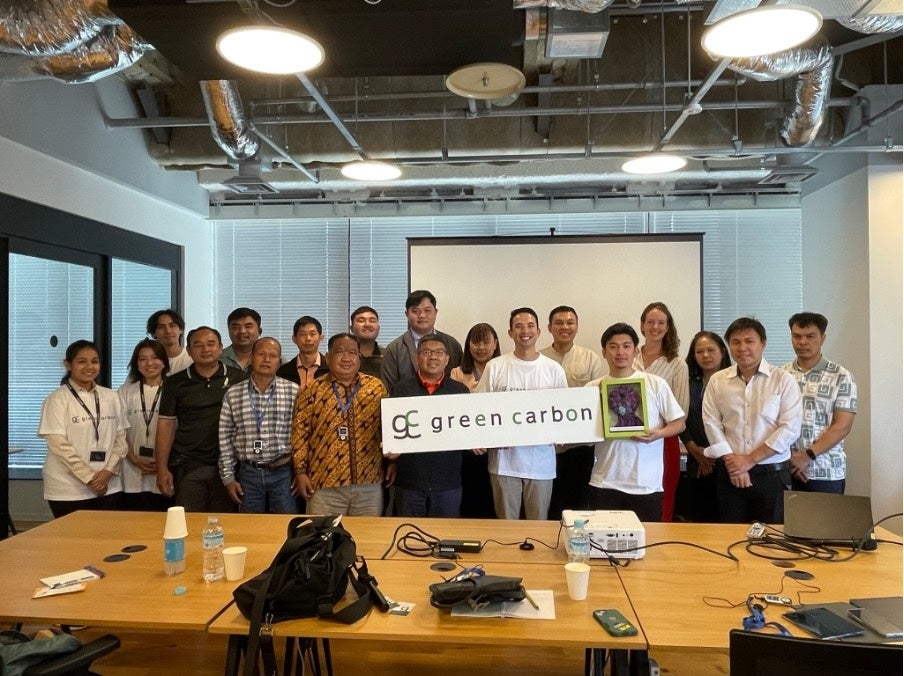
◆Outcomes of the Inspection and Visit
On the day before their headquarters visit, the DOAE delegation inspected Sumikko Farm in Ibaraki Prefecture, a farm partnered with Green Carbon. They observed the practical application of biochar and exchanged information with farmers who had traveled from Thailand for the inspection. The role Green Carbon played in bridging the gap between Thai and Japanese farmers was highly appreciated. During their visit to the headquarters, Green Carbon introduced its domestic and international initiatives and business plans, exploring the potential for future collaboration on carbon credit generation using AWD and biochar in Thailand.
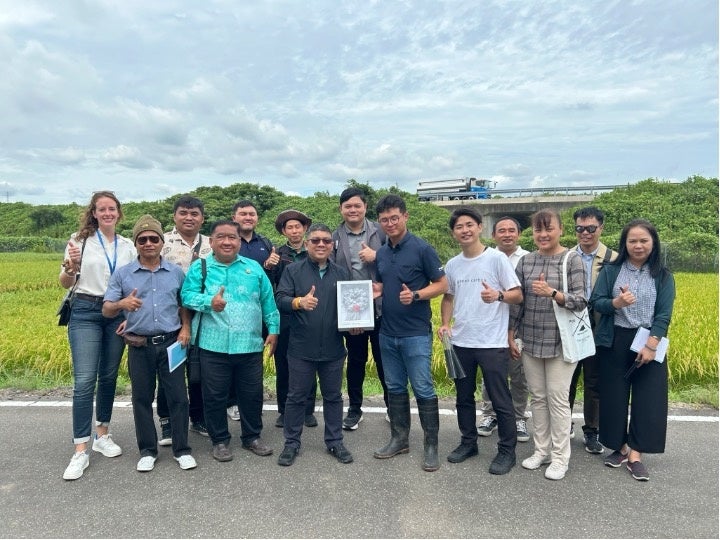
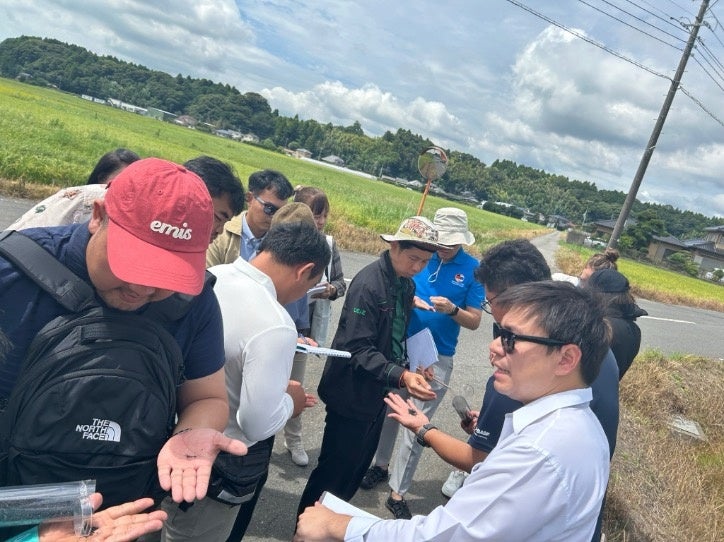
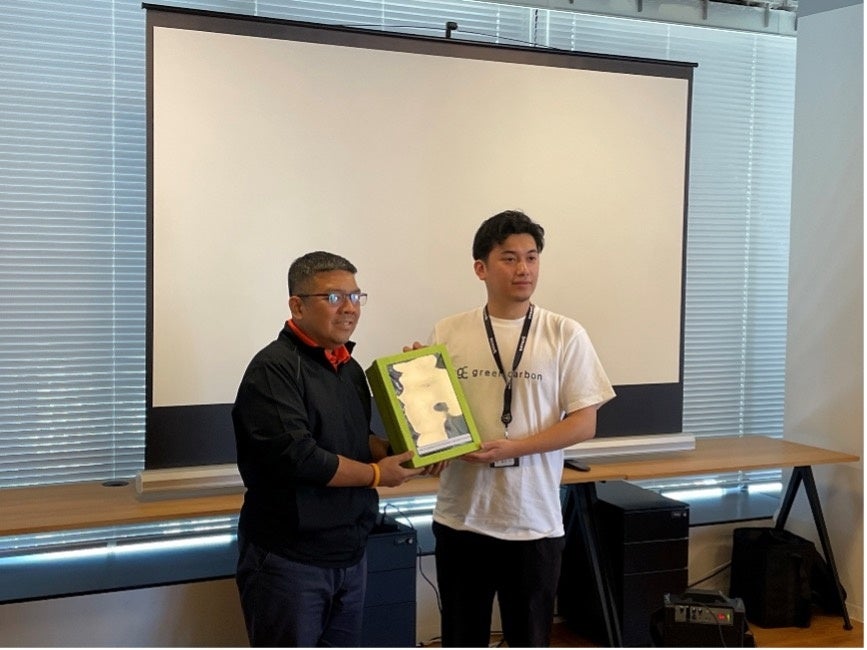
To the right: Ike, Public Relations for Green Carbon, Inc.
◆Future Outlook
Green Carbon is currently in the process of establishing a local subsidiary in Thailand. The company’s goal is to create a “world-standard carbon reduction model originating from Asia” by focusing on projects that combine climate change countermeasures with an increase in farmers’ income. These initiatives will be centered on projects like reducing emissions from rice cultivation by introducing AWD in the agricultural sector and producing, selling, and creating credits from biochar made from agricultural residues.
The Thai government currently regards reducing greenhouse gas emissions in the agricultural sector, particularly methane from rice paddies, as one of the most critical issues in its national climate change policy. With the Premium T-VER scheme promoted by the Thailand Greenhouse Gas Management Organization (TGO) and the Ministry of Agriculture and Cooperatives (MoAC)’s efforts to enhance the promotion of AWD technology, the country is accelerating the development of a decarbonization model based on rice paddies at a national level. Going forward, Green Carbon plans to gradually expand its projects to major agricultural provinces, including Phitsanulok, Ayutthaya, and Nakhon Ratchasima, with a goal of reaching 1.5 million hectares. The company will collaborate with investors, companies, and government agencies both in Thailand and abroad to form one of Asia’s largest decarbonization projects from rice paddies.
Additionally, Green Carbon plans to establish a three-way model—carbon sequestration, soil improvement, and farmer profit—primarily in Southeast Asia, and will begin full-scale issuance of biochar CDR (Carbon Dioxide Removal) credits. The company will particularly focus on the following:
- Building a suitable biochar production model for local resources (e.g., rubber and rice husks).
- Creating hub locations in collaboration with RAOT, agricultural universities, local governments, and corporations.
- Selling credits via international platforms like Puro.earth.
- Designing schemes that consider initial investment and direct transactions with major corporations.
In Thailand, Green Carbon signed an MOU with the Rubber Authority of Thailand (RAOT) in 2024 to accelerate a project that converts unused resources like pruned branches and harvested wood from rubber plantations across the country into biochar. The company’s future focus areas include:
| ●Developing a Biochar CDR Hub in Collaboration with the Rubber Industry |
|---|
| In partnership with the Rubber Authority of Thailand (RAOT), cooperatives, fertilizer companies, universities, and local government, we aim to establish a circular regional model. This initiative will utilize the annual emissions of pruned trees (up to 15 million tons) generated over a six-year period after felling. |
| ●Strengthening Local Economies and Decarbonization by Utilizing Agricultural Residue |
|---|
| We are promoting an integrated biochar project that uses agricultural residues such as pruned trees, rice husks, and palm shells generated by farmers. This simultaneously improves farmer income, enhances soil quality, and reduces greenhouse gas emissions. |
| ● Registering with International Certification Bodies and Selling on the CDR Market |
|---|
| We plan to register the produced biochar with international certification bodies like Puro.earth to have it credited on the Voluntary Carbon Market (VCM). Our goal is to sell these credits to RE100 member companies and overseas Carbon Dioxide Removal (CDR) funds. |
| ● Integrated Model with Alternate Wetting and Drying (AWD) |
|---|
| We are also planning to develop a “decarbonization credit creation model using entire farmlands.” This model will combine methane reduction from paddy fields through Alternate Wetting and Drying (AWD) with CDR from biochar. |
※1: Alternate Wetting and Drying (AWD)
AWD is a rice paddy irrigation method in which water is alternately supplied and naturally dried every few days based on the water level in the field. Compared to continuous flooding, AWD reduces water usage and helps conserve water resources.
※2: Premium T-VER
A high-quality voluntary credit scheme promoted by the Thai government. It issues reliable carbon credits for companies and municipalities through strict monitoring, verification, and registration procedures in compliance with international standards.
◆Green Carbon Inc.
Founded: 2019
Head Office: Hanzomon PREX North 9F, 2-3-2 Kojimachi, Chiyoda-ku, Tokyo
Representative: Jun Okita, CEO
Business Activities: Carbon credit generation and sales, agricultural-related business, environmental-related business, and other related activities, including ESG consulting
◆Green Carbon Business Overview
Green Carbon operates with the vision of “Saving the Earth through the power of life,” offering end-to-end support for the creation, registration, and sales of nature-based carbon credits both domestically and internationally. In addition, the company is engaged in agriculture-related businesses, R&D projects, and ESG consulting services.
Its business footprint spans Japan and Southeast Asia, extending to Australia and South America, generating nature-based carbon credits from rice paddies, biochar, forest conservation, carbon farming, mangrove reforestation, and methane reduction from livestock.
In Japan, Green Carbon obtained the first and largest-ever J-Credit certification for rice paddies in 2023 (approximately 6,220 tons), and expanded the project to around 40,000 hectares (about 80,000 tons) in 2024.
Green Carbon also provides “Agreen”, a one-stop platform that streamlines the entire process from credit registration and application to sales, simplifying procedures and documentation while significantly reducing the workload for credit creators.

